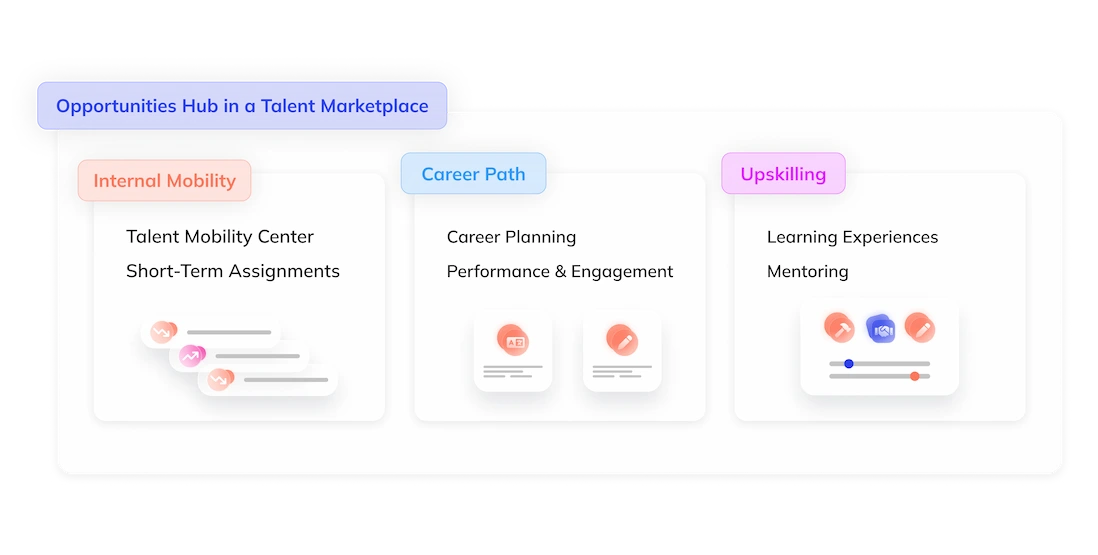Talent Management is a Human Resources discipline whose aim is to attract, develop and retain high-potential profiles within a company. These exceptional profiles are considered the keys to a company’s growth and competitiveness, and are said to be 8 times more productive than other employees.
Faced with both international competition and local labor market challenges in recruiting future leaders, multinationals are investing heavily in talent management.
Managing this population is becoming a veritable state of mind, which now tends to apply to all of a company’s employees. So how do you differentiate between a practice dedicated to a certain fringe of the workforce, and the management of employees as a whole?
To answer this question, we will define the modern concept of talent and then illustrate the two main differences between these two HR activities.
Let's start by defining "a talent"
Understanding “Talent” in the broadest sense
Talents are employees whose know-how (skills technical) and behavioural skills (skills behavioural) exceed the average of all employees.
According to a survey carried out in 2020 by ANDRH on talent management in French companies, almost 80% of respondents identify talent by the combination of potential and performance. Other criteria based more on the notion of “collective” are now appearing in the definition of a talent. These include adherence to a company’s culture and values. A talent is therefore a committed, motivated and motivating individual. It brings together the following assets:
- A great capacity to learn for himself
- Advanced abilities to pass on knowledge, the desire to help others progress.
The example of managerial talent
The book War of Talent, published in 2001 and written by Ed Michaels, Helen Handfield-Jones and Beth Axelrod, focuses on the art of being an inspiring Manager . The authors identify talent as a combination of several behaviors:
- A sharp strategic mind
- A leadership capacity
- Superior understanding of complexities
- An emotional intelligence
- Communication skills
- The ability to attract and inspire other rising stars
- An entrepreneurial instinct
- A capacity to produce results
What are the most sought-after managerial skills today?
Our article“The Top 5 new assets for managers” will help you select the right individuals and train them afterwards.
How to differentiate between Talent Management and People Management?
First difference: Elitist vision vs. inclusive vision
The elitist vision
It stems from the still vivid reminiscences of the scarcity context described in the above-mentioned book.
The scarcity of top-level professionals resulting from the advent of exacerbated competition, has brought to the forethe elitist notion of “top performers”, “high value-added or highly qualified population”.
Not every employee is a pillar of the organization, and there are as many motivations, ambitions and assets within a company as there are employees. Should talent management always focus on certain individuals?
The difference between these 2 approaches lies in the choice between the inclusive or the elitist option. Statistically speaking, the option chosen by the majority of companies is the elitist vision, which seems to offer the greatest return on investment.
This concept is tempered today by a persistent disengagement of employees: only 7% declare themselves "committed".
The resignation boom in Q1 2023, with 550,000 people resigning, is 'one of the sources of this inclusive philosophy.
Talent Management is deploying a less elitist vision to progressively involve all employees in the minds of HR teams, and to focus on valuing and mobilizing each skill.
Do the values of adherence to the company’s culture, commitment, ability to learn, develop people and cooperate, take precedence over tangible results in the role?
The inclusive vision
It implies that the company strives to build HR policies that recognize and value the diversity of abilities of all individuals. By highlighting and recognizing the implicitskills that characterize each individual, this management model can contribute more to professional and personal fulfillment. The rapid evolution of professions is giving rise to a strong appetite for reconversion (1 in 2 French people are currently considering this). This gives employees the opportunity to make the most of previously unused skills skills, or to acquire new ones through reskilling schemes.
As such, you may be inspired by our article on the new opportunities to rise in skills .
As a result, a majority of HRDs believe that talent management policy now concerns all employees (compared to 44% of employees in 2017).
Second difference: tailoring individual career paths
According to a McKinsey report, the leading factor in disengagement in 2021 and 2022 is the lack of visibility on career prospects (41%). A meaningful career path is built on 3 elements:
- Assets that can currently be mobilized
- Individual appetites and aspirations
- The skills of the future identified by the company
Personalizing career paths
Within Neobrain, employees can visualize all the company’s business lines according to the proximity between the skills required, those they possess and the skills they wish to develop. In this way, employees can build up a unique scheme based on their own skills:
- Career development opportunities
- Skills to be acquired
- A multi-stage retro-planning process.
Carry out a tailor-made accompaniment of the trainings
Talents expect to benefit from training dedicated to the skills they wish to acquire, rather than compulsory training in areas they do not appreciate: tailor-made training is now the norm.
At Neobrain, each training component is associated with a skill and an acquired level. In this way, not only can the employee find the training that suits him or her, but his or her manager or rh team can also suggest training courses adapted to the skills to be influenced.
Personalize internal opportunities
Talent is characterized by its thirst for learning and often for exposure. This is why Neobrain provides a platform of internal opportunities. These include both permanent positions and one-off projects. This way, employees can consider a move to permanent positions and get involved, or learn through additional assignments related to their professional project.

Third difference: the need for intelligent HR solutions
Today, the number of people using management solutions such as payroll, expense reports, annual appraisals or Learning Management Systems has risen considerably. What talent now demands is a seamless integration of each of these aspects into one intelligent platform. Multiplying HR tools is no longer an option.
One question: do your employees still have to open a software program to meet their performance objectives, and then another to consider training support?
The future lies in interconnected HR ecosystems thanks to Smart Data. This is what Neobrain proposes in its “Talent Intelligence Platform”.
In conclusion: Talent Management as the culmination of Hr Excellence
This specialty is partly responsible for the greatest successes of companies, especially those in the new technology sector (Google, Facebook, Apple).
By hiring and retaining exceptional employees, a company can significantly outpace its competitors and raise barriers to entry.
Talent Management is thus the innovative sphere of Human Resources when it comes to managing a company's people. The richest areas of Talent Management include, in order of priority :
- The development of skills
- Performance evaluation
- Talent acquisition
While employee management can be summed up in the global notions of career, mobility, performance or training, we can say that Talent Management is a true state of mind where personalization is central. A successful Talent Management strategy allows a company to stand out in a competitive market, and more globally, contributes to its great success.
Defining the characteristics of a talent for a given company, knowing how to acquire it, develop it and finally retain it, are activities carried out in concert; AI is a lever that accompanies the HR team throughout this process.
Neobrain is recognized for the relevance of its technology and its adaptation to the corporate culture, read more on our page “AI and talent management“.







